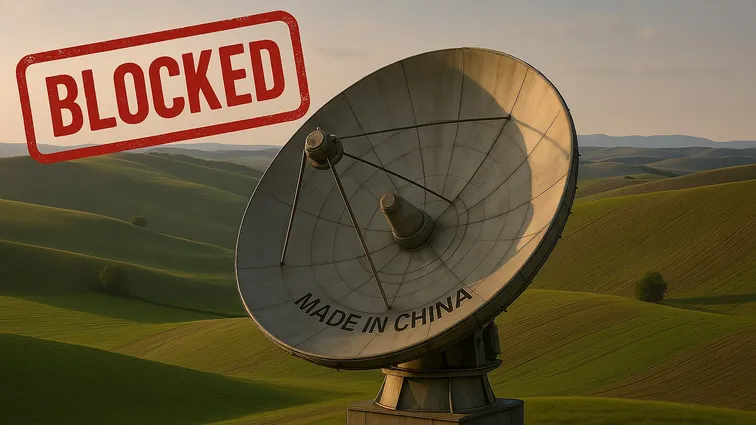In a landmark move, the Czech government has, for the first time, exercised its powers under the Foreign Direct Investment (FDI) Screening Act to prohibit a foreign investment on national security grounds. While the government’s reasoning remains classified, the decision signals a shift toward a more interventionist stance on foreign investments in the Czech Republic.
BACKGROUND OF THE CASE
On 19 March 2025, the Czech government issued a resolution under the Czech FDI Act instructing the Ministry of Industry and Trade (the “Ministry”) to prohibit Emposat from continuing its investment in the Czech Republic. Since the Act entered into force nearly four years ago, this is the very first case resulting in a prohibition.
The investment concerned the operation of a satellite ground station equipped with a 7.3-meter parabolic antenna in Vlkoš, South Moravia, which the government concluded posed a threat to national security or public order. Emposat, a Beijing-based company, operated the station in cooperation with Brno-based Pekasat. The Czech partner has claimed its involvement was limited to leasing land and infrastructure, and that it had no financial or operational ties with Emposat. According to media reports, the decision was influenced by security assessments from Czech intelligence agencies.
LEGAL PERSPECTIVE: THE CZECH FDI FRAMEWORK IN ACTION
Since 1 May 2021, the Czech Republic has had a legal framework in place for screening foreign direct investments. The FDI Screening Act gives the Ministry authority to review investments by non-EU entities – both individuals and companies – and, where justified, to forward them to the government for a decision. The government may then prohibit the investment if it deems it a risk to national security or public order.
Certain investments, particularly those involving critical infrastructure, military technologies, or specific dual-use items, are subject to mandatory notification and pre-closing approval. However, the Czech FDI Act also allows the Ministry to review non-notified investments ex-officio, up to five years after closing, if security concerns emerge.
In the Emposat case, although the investment clearly involved a sensitive area, it apparently did not trigger the mandatory notification requirement, and there are no public indications that it was notified. This suggests the Ministry relied on its call-in powers and initiated its review ex-officio after the investment was already underway. This demonstrates that the Ministry is actively monitoring the market and is prepared to initiate a review if concerns arise. It also shows that greenfield investments – often perceived as lower-risk – are very much within the scope of FDI scrutiny.
The government’s resolution does not include any detailed reasoning, and it is unlikely that the Ministry will provide further information when it issues the final decision. Emposat will have the right to challenge the decision before the administrative courts. If it does, it will be interesting to see how the courts handle such a politically and security-sensitive case, particularly regarding judicial review of executive discretion.
RECOMMENDATIONS FOR FOREIGN INVESTORS
The Emposat case sends a clear signal: the Czech FDI regime is real, active, and capable of blocking foreign investments when national interests are at stake, even after implementation. While a Chinese-operated satellite ground station might seem like a clear-cut candidate for prohibition, non-EU investors across all sectors should take note of several key lessons:
- Comprehensive risk assessment: Carefully assess whether your planned investment could raise national security concerns. This applies particularly to sectors such as telecoms, energy, healthcare, defence, or information technology including AI.
- Engage with the Ministry: If your investment touches a sensitive area, engage early with the Ministry, even if the deal doesn’t fall under mandatory notification. Also, note that not only acquisitions of Czech targets, but also setting up operations in the country from ground up may become subject to review.
- Transparency and cooperation: Maintain open communication with the Czech authorities. Be prepared to provide details about your investment’s structure, financing, ownership, and intended use. Regulators are proactive and may use external intelligence sources to monitor foreign investments.
- Stay informed and prepared: The Czech FDI regime is new, evolving, and less predictable than merger control. Keeping track of case developments and regulatory interpretations is crucial to avoid surprises.
FINAL THOUGHTS – BEYOND THE FIRST PROHIBITION
The Emposat case marks a turning point in the enforcement of Czech FDI rules. It confirms that the legal framework is not just symbolic, it is enforceable. While this enhances the protection of national security, it also introduces greater regulatory risk for foreign investors.
So far, the Ministry has taken a relatively cautious and pragmatic approach to FDI enforcement. But that may change the moment local politicians fully realize the power of this tool. There is a fine line between the protection of national security and the protection of national interest, a line that is already starting to blur in some jurisdictions.
The absence of a clear definition of what constitutes national security or national interest, and the varying interpretations across member states (does Czechia view national security in the same way as Hungary?), only add to the uncertainty. The lack of a unified European approach to security screening creates fragmentation and unpredictability for cross-border investors.
This is further compounded by the inherent opacity of the regime – decisions are not published or reasoned in detail (for understandable confidentiality reasons), and annual reports are brief and issued with delay. This makes it harder for investors to gauge the practical application of the rules or benchmark past cases.
For foreign investors, the message is clear: the Czech Republic remains open to investment, but national security scrutiny is real and growing. By approaching Czech investments with early legal guidance, detailed planning, and strategic engagement, investors can better navigate the system and avoid unexpected hurdles.








